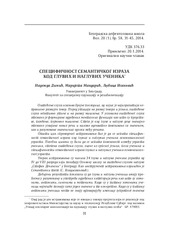Приказ основних података о документу
Semantic specificity of expression in deaf and hard of hearing students
Specifičnost semantičkog izraza kod gluvih i nagluvih učenika
| dc.creator | Dimić, Nadežda | |
| dc.creator | Mandarić, Marijeta | |
| dc.creator | Isaković, Ljubica | |
| dc.date.accessioned | 2021-06-09T14:02:14Z | |
| dc.date.available | 2021-06-09T14:02:14Z | |
| dc.date.issued | 2014 | |
| dc.identifier.issn | 0354-8759 | |
| dc.identifier.uri | http://rfasper.fasper.bg.ac.rs/handle/123456789/806 | |
| dc.description.abstract | Hearing impairment causes a diverse range of consequences, the most profound of which is improper speech development. In addition to the impact on the development of speech and language skills, hearing impairment negatively affects the development of thinking. In the case of hearing impairment there are difficulties in developing certain mental functions such as notion, memory and cognitive thinking. Therefore, deaf and hard of hearing children have difficulties in adopting new words and connecting them with their meanings, as well as understanding semantic relations between words. The overall aim of this research was to examine semantic specificity of expression in deaf and hard of hearing students of elementary school age. The specific goals were to examine the relationship between the semantic specificity of expression in deaf and hard of hearing students and students' age, sex, degree of hearing impairment and school grades in Serbian language. The research sample consisted of 34 deaf and hard of hearing students between 4th and 8th grade attending 'Stefan Decanski' elementary school for deaf and hard of hearing students in Belgrade. What was used as the research instrument was Semantic test (Vladisavljevic). The obtained results showed that students have difficulties in understanding and using some categories of words like homonyms, antonyms, synonyms and metonyms. when it comes to homonyms students usually know only one meaning, the most common one. When it comes to antonyms students often do not know appropriate noun of opposite meaning, and they resort to using adjectives or verbs of opposite meaning instead of nouns. Students weren't successful when they had to write synonyms of given words. When it comes to metonyms students showed understanding of alternate and metaphorical meanings of words that are often associated with stereotypical usage. It was determined that there is a partial influence of age, degree of hearing loss and success in Serbian language subject in school on semantic expression in deaf and hard of hearing students of elementary school age. Correlation between students' sex and semantic expression has not been proven. | en |
| dc.description.abstract | Oštećenje sluha izaziva brojne posledice, od kojih je najizrazitija nepravilno razvijen govor. Pored uticaja na razvoj govora i jezika, oštećenje sluha negativno utiče i na razvoj mišljenja. U uslovima oštećenog sluha otežano je formiranje određenih mentalnih funkcija kao što su predstave, pamćenje, pojmovno mišljenje. Stoga je kod gluve i nagluve dece značajno otežano usvajanje novih reči i njihovo adekvatno povezivanje sa značenjem, kao i razumevanje značenjskih odnosa među rečima. Opšti cilj sprovedenog istraživanja bio je da se ispita specifičnost semantičkog izraza kod gluvih i nagluvih učenika osnovnoškolskog uzrasta. Posebni ciljevi su bili da se ispita povezanost između uzrasta učenika, stepena oštećenja sluha, ocene iz srpskog jezika, pola učenika i specifičnosti semantičkog izraza gluvih i nagluvih učenika osnovnoškolskog uzrasta. Uzorak istraživanja su činila 34 gluva i nagluva učenika uzrasta od IV do VIII razreda koji pohađaju Osnovnu školu za oštećene sluhom-nagluve 'Stefan Dečanski' u Beogradu. Kao instrument istraživanja korišćen je Semantički test (S. Vladisavljević). Dobijeni rezultati pokazali su da gluvi i nagluvi učenici imaju problema u razumevanju i upotrebi određenih kategorija reči kao što su homonimi, antonimi, sinonimi i metonimi. Kada su u pitanju homonimi učenici najčešće poznaju samo jedno značenje i to konkretno. Kada su u pitanju antonimi učenici često ne znaju odgovarajuću imenicu suprotnog značenja pa se služe odgovarajućim pridevima ili glagolima. Učenici su pokazali najslabiji uspeh prilikom ispitivanja poznavanja sinonima. Kada su u pitanju metonimi učenici poznaju prenesena značenja za one reči uz koje se često vezuju određene stereotipne osobine. Utvrđeno je da postoji delimičan uticaj uzrasta učenika, stepena oštećenja sluha i uspeha iz srpskog jezika na semantički izraz gluvih i nagluvih učenika osnovnoškolskog uzrasta. Uticaj pola učenika na semantički izraz nije utvrđen. | sr |
| dc.publisher | Univerzitet u Beogradu - Fakultet za specijalnu edukaciju i rehabilitaciju, Beograd | |
| dc.relation | info:eu-repo/grantAgreement/MESTD/Basic Research (BR or ON)/179055/RS// | |
| dc.rights | openAccess | |
| dc.rights.uri | https://creativecommons.org/licenses/by-sa/4.0/ | |
| dc.source | Beogradska defektološka škola | |
| dc.subject | deaf and hard of hearing students | en |
| dc.subject | semantic expression | en |
| dc.subject | homonyms | en |
| dc.subject | antonyms | en |
| dc.subject | synonyms | en |
| dc.subject | metonyms | en |
| dc.subject | gluvi i nagluvi učenici | sr |
| dc.subject | semantički izraz | sr |
| dc.subject | homonimi | sr |
| dc.subject | an- tonimi | sr |
| dc.subject | sinonimi | sr |
| dc.subject | metonimi | sr |
| dc.title | Semantic specificity of expression in deaf and hard of hearing students | en |
| dc.title | Specifičnost semantičkog izraza kod gluvih i nagluvih učenika | sr |
| dc.type | article | |
| dc.rights.license | BY-SA | |
| dc.citation.epage | 45 | |
| dc.citation.issue | 1 | |
| dc.citation.other | 20(1): 31-45 | |
| dc.citation.rank | M52 | |
| dc.citation.spage | 31 | |
| dc.citation.volume | 20 | |
| dc.identifier.fulltext | http://rfasper.fasper.bg.ac.rs/bitstream/id/693/803.pdf | |
| dc.identifier.rcub | https://hdl.handle.net/21.15107/rcub_rfasper_806 | |
| dc.type.version | publishedVersion |


